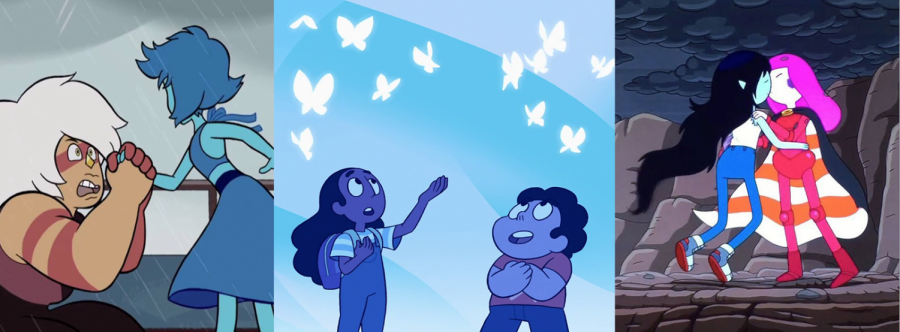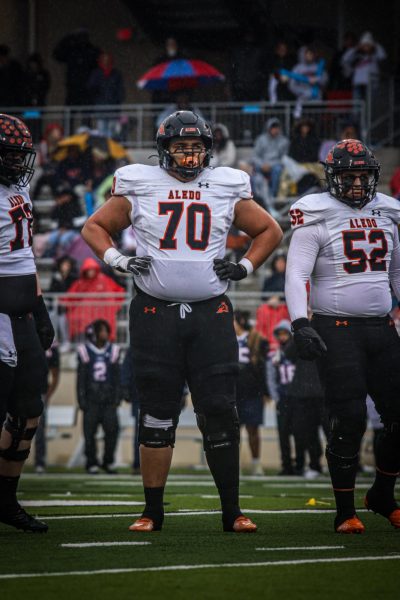Steven Universe takes on Mature Topics
From a young age, cartoons have impacted our lives. “The Powerpuff Girls” and “Teen Titans” taught right from wrong, while “Phineas and Ferb” taught us that anything is possible. Cartoons may be targeted at children ages from 2 to 12, but they continue to deal with serious topics that even adults have a hard time understanding. A new leader in cartoons that take on tough topics is Cartoon Network’s “Steven Universe.” The show revolves around a young boy named Steven, who is half human and half Gem. He belongs to a group of intergalactic heroes called the Crystal Gems, who all work together to solve human and universal problems on earth.
In 2016, ahead of the curve, animated TV show “Steven Universe,” came out with “Mindful Education.” This episode is about Connie, Steven’s best friend, and her guilt relating to accidently beating someone up. Steven, not knowing any better, tells her to just try and forget it. Steven’s own newly provoked guilt leads to him having hallucinations of things he’s done and feels terrible about, which often included sensitive topics such as war and violence. This scene is very different from the usual light-hearted Steven and his playful heroism. This breaks down the wall of fiction separating the character and the viewer, showing the audience, the majority of whom are children, that it’s okay to make mistakes and not know how to deal with them.
This was not the first time Steven Universe dealt with topics similar to this. One prevalent and predominant theme in the show is unhealthy relationships. Perhaps the strongest unhealthy relationship is that between timid Lapis Lazuli and the everso dominant Jasper. In the episode “Alone at Sea,” Lapis describes that, even though it was torture to be Malachite, the fusion of Lapis and Jasper, Lapis actually misses being fused with Jasper. In a later episode, Jasper comes back and asks to fuse with Lapis again claiming that she’s changed and that she’ll be better this time, claims that abusers often make. This clearly illustrates an abusive and toxic relationship. This series of events teaches the audience of the importance of recognizing abuse and how to take the appropriate steps to get away. The episodes also demonstrated something that is very common in a toxic relationship: recognizing that the relationship was unhealthy, but still missing it and longing to be back with that person. To someone who has never been in an unhealthy relationship the thought of missing your abuser sounds ridiculous, but it is extremely common. In the victim’s eyes, no matter what happened in the relationship, there was love and emotional dependence. Steven Universe has nailed what abusive relationships really are without losing the plot of the show or becoming “preachy.”
Steven Universe deals with this mature topic better than a lot of shows targeted at adults do. Very few shows deal with PTSD or the reality of abusive relationships, let alone kid shows. Although Steven Universe is pioneering the way for serious topics in a new generation of cartoons, more and more kids shows/cartoons are taking on the challenge of properly portraying serious topics and social issues. “Avatar: The Last Airbender” sequel, “Legend of Korra,” also has the titular character deal with depression and severe PTSD. “Adventure Time” and “The Loud House” both include gay/bisexual characters, as shown when Marceline the Vampire Queen and Princess Bubblegum kissed in Adventure Time’s finale. Kudos to the shows that go where no show has gone before.








Supergirl245 • Dec 13, 2020 at 3:34 pm
I love Steven Universe, I’m only fifteen and still watch it and love the movie, it sort of flew over my head about that, but I did notice that Pearl has a lot of unresolved issues when she sings about Rose really being gone, and I think that she still has them, but this is one of the shows that kids and adults love, and I love it. Garnet embodies how everyone is somehow fused with someone else healthily, and Amythest embodies that one side of everyone that wants to let loose.